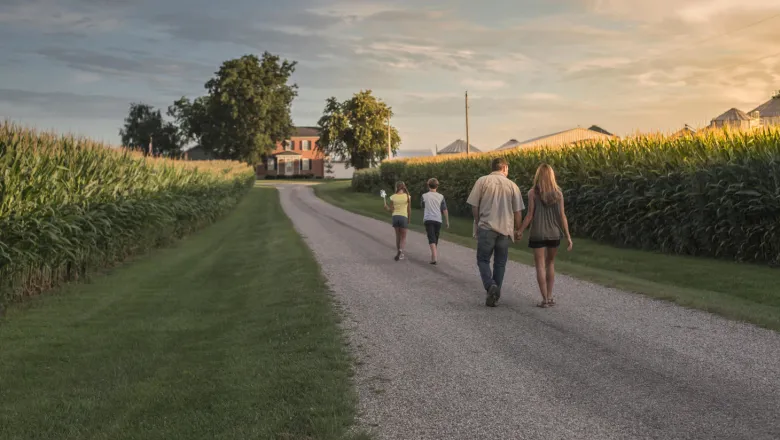From City Lights to Country Nights: A Beginner’s Guide to Buying Land

Home & Land Financing
Have you been thinking of trading in traffic and noisy neighbors for the peace and quiet of your own acreage in the country? Are you struggling with where to start? Good news! The following blog article will give you some action items you can take now to prepare for the future you want tomorrow. It’s helpful to set some parameters around your goals before getting in touch with a real estate agent or lender.
What’s your purpose?
Before you start browsing listings or scheduling property tours, take time to reflect on why you want to buy land. Your purpose will shape every decision that follows, from location to lot size to financing.
Ask yourself:
- Are you looking for a permanent residence or a weekend retreat?
- Do you want to raise animals, grow your own food, or simply enjoy nature?
- Is this an investment for future generations or a lifestyle change for today?
- Will you build a home, or are you open to buying land with an existing structure?
Action Step: Write a purpose statement.
Example: “I want to enjoy a quiet life with my family, with plenty of room for my kids and pets to roam. I’d like to raise chickens and grow a garden to support a more self-sufficient lifestyle.”
How much land do you need?
The amount of land you need depends on your goals. A few acres may be perfect for a garden and a small home, while a working farm or hunting property could require dozens, or even hundreds of acres.
Considerations:
- Maintenance: More land means more upkeep—mowing, fencing, and general care.
- Taxes: Property taxes vary by county and land use.
- Development Costs: Larger lots may require more investment in infrastructure like roads, wells, and utilities.
Quick Reference:
- 1 acre ≈ size of a football field (minus the end zones)
- Hobby farm: ~5 acres
- Homestead: 5–10 acres
- Hunting land: 20+ acres, depending on terrain and wildlife
Action Step: Identify your ideal acreage range.
Example: “I’m looking for 5–10 acres to support a garden, small livestock, and a modest home.”
What utilities are required?
Not all rural land comes with modern conveniences. Some properties may lack access to public water, sewer or even electricity. Knowing what you need and what you’re willing to live without can help narrow your search.
Questions to Ask:
- Do you need high-speed internet for remote work or streaming?
- Are you comfortable with well water and a septic system?
- Is access to natural gas or public utilities important to you?
Action Step: Make a list of must-have utilities and those you can live without.
Narrow your field.
Location is about more than just scenery. Think about your lifestyle, daily needs, and long-term plans.
Factors to Consider:
- Proximity to schools, hospitals, grocery stores, and airports
- Commute time to work or family
- Local zoning laws and land use restrictions
- Future development in the area
Pro Tip: Visit potential areas at different times of day and talk to locals. Also, contact the county planning or zoning office to understand what can and can’t be built nearby.
Action Step: List your top three preferred areas.
Build or buy?
Do you want to design your dream home from the ground up, or would you prefer the convenience of an existing structure?
Building Pros:
- Custom layout and features
- Energy-efficient and up to code
- Long-term satisfaction
Building Cons:
- Longer timeline
- Higher upfront costs
- Potential permitting delays
Buying Pros:
- Move-in ready
- Established utilities and infrastructure
- May include outbuildings or fencing
Buying Cons:
- May require renovations
- Less flexibility in layout and design
Action Step: Choose your preference:
☐ Build
☐ Buy
☐ Keep my options open
Financing your dream.
Once you’ve clarified your goals, it’s time to talk financing. Rural land purchases often require specialized loans that differ from traditional home mortgages. That’s where Farm Credit comes in.
With deep roots in agriculture and rural communities, Farm Credit understands the unique needs of land buyers. Whether you're purchasing raw land, building a home, or starting a small farm, we offer flexible financing options and expert guidance to help you move forward with confidence.
Action Step: Reach out to a Farm Credit loan officer at 1 (800) 919-3276 or contact us online to explore your options and get pre-qualified.
Ready to begin?
Buying land is a big step, but with the right preparation, it can be the start of something truly rewarding. Use this guide as your roadmap, and when you're ready, Farm Credit is here to help you turn your rural dream into reality.